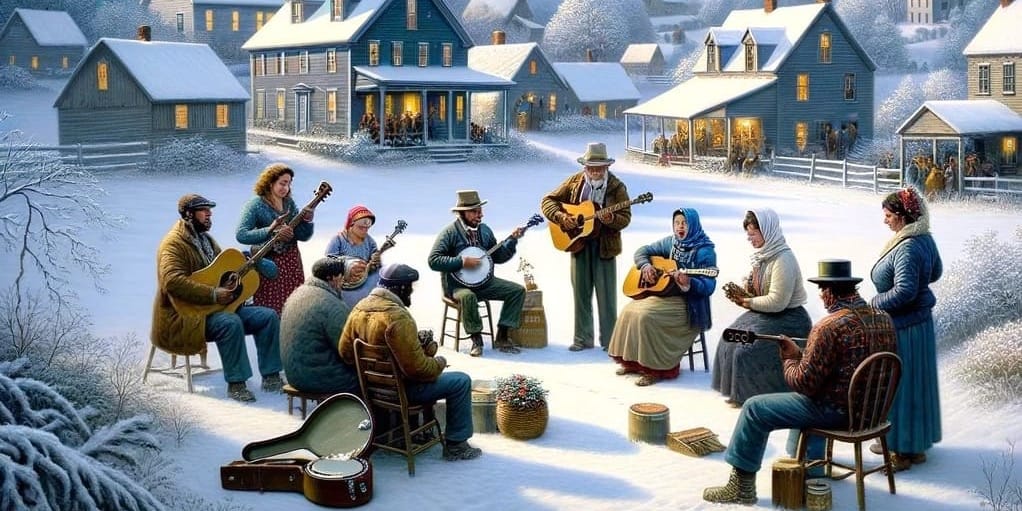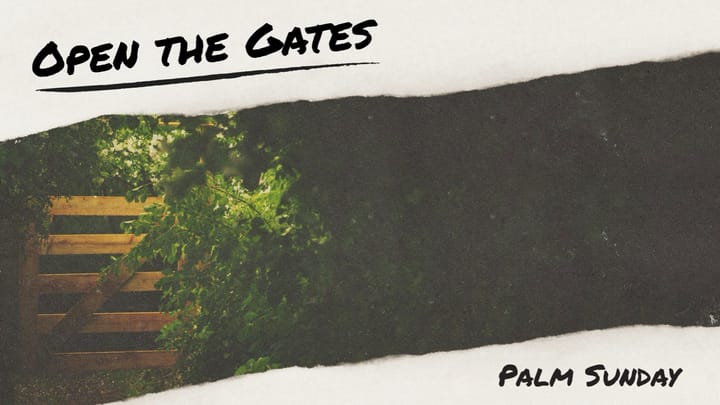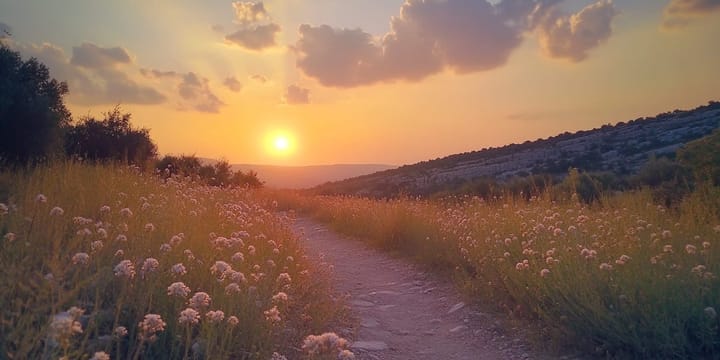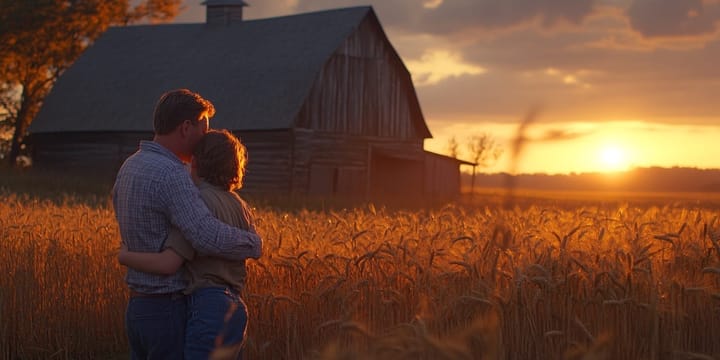Fairhaven Sermon 12-24-2023
Powerful, sacred songs pull us into truth; singing them unites us with billions, as if the music itself is a prayer drawing us to God.

This week's Sermon was delivered by Rev. Dylan Parson and focuses on the deep connection between music, spirituality, and personal experiences. Rev. Parson shares his own encounters with a bluegrass community in Newark, Ohio, where Appalachian immigrants found a sense of belonging and expressed their experiences of loss and displacement through music, especially highlighted by the song "Paradise" by John Prine.
Rev. Parson draws parallels between these communal music experiences and the songs in the Bible, which convey the emotions and stories of God's people. He discusses the role of songs like the Psalms, the Magnificat (sung by Mary), and the Benedictus (sung by Zechariah), showing how these biblical songs capture the singers' emotions and experiences. These songs, according to Rev. Parson, are not just words but expressions of deep feelings and truths. They unite people across time and space, resonating with their experiences and emotions.
The sermon concludes by emphasizing the power and significance of sacred music in expressing and shaping spiritual experiences. Rev. Parson encourages the congregation to embrace the joy and message of Mary's song, particularly relevant during the Christmas season, and to recognize the unifying and transcendent power of such music in their own spiritual journeys.
Transcript
So I was actually going to open talking about something completely different, but I had a different idea. So bear with me here for a second as I do this off the top of my head. The town that I went to college in, which was about 25 minutes outside of Columbus, was a really interesting little town, beautiful little town, Grandville, Ohio. And it is set up like it was settled by people coming from New England, from Connecticut, Massachusetts, and they reproduced this beautiful little New England town in the middle of Ohio.
Super, like if you wanted to change the color of your shutters on your windows or whatever, you had to go through the council. It was very preserved, this little New England town in the middle of Ohio. But it was right outside a slightly bigger town, someplace that felt pretty much like western Pennsylvania, and that was Newark, Ohio, which is just a little bit further outside of Columbus. And Newark, like a lot of our cities around here, like a McKeesport or a Butler or something like that, was once an industrial town.
It was a place where they made, I believe, glass, and their big thing was tires. They have not made tires in Newark in many, many years, but whenever the tire factory was running full steam, it ended up being a place that drew a lot of people from elsewhere. And so a group of people that ended up coming to Newark, migrating to Newark, Ohio, to work in the tire factory, was a lot of people from the Appalachian region. A lot of people who came from eastern Kentucky, from southern West Virginia, places where they had once done some mining and that had already faded.
These people packed up whenever there were no jobs to be had in the mountains, and they moved to Newark to go make tires. So what this resulted in is an unusually large population of, you could call them immigrants, from the mountains. And what they would do is they developed this kind of vibrant bluegrass subculture in the area that led to some strange things. Like Denison was just a small liberal arts college, but for whatever reason, they had a bluegrass major.
There was a huge bluegrass population around there, and whenever they had bluegrass concerts, it would fill up the whole chapel there. And what they would do, this is something that I discovered my first year there, is every Wednesday, a bunch of the older people from town would come into the student union and they would play for the first three hours of the morning, 9 to 12, they would just play bluegrass music. And none of them had sheet music or anything like that. Someone would call something out and they would just play it.
I don't play any instruments. I have wanted to play the banjo for many, many years, not to the point of actually trying, but I've thought about it. Me and Dave have thought about making a nice banjo band to have up here to lead worship someday. But I would go every Wednesday that I wasn't too busy doing something else, finishing some homework, studying for a test, and I would go listen to all the old people from West Virginia play their bluegrass music.
Old people. And what I noticed is there were some songs that they would sing every single week. Some of them that I knew, some of them were instrumental, and the ones that I did know that I could sing along with, they would ask me, Oh, come on, sing with us, and I would maybe do one a week. But one that they would sing every week, and I thought this was a folk song, for the longest time, is called Paradise.
It ends up, it's actually by John Prine, it was written in the 1970s. And what this song is about, it's the perspective of a young man who's from a town called Paradise, Kentucky, along the river, and his parents grew up there. And he asked his parents, Why can't we go back? Why can't we go back? And the whole refrain of the song is, The coal train has taken away Paradise. The town has been mined, it's been wiped out, there's nothing left there, the river's all polluted.
In the town, you can't go back there, because it's gone. And I thought that they were singing this song that was a folk song that came from their memories of where they grew up, but it wasn't. It was a song that was written that so deeply reflected their experience of home, that they can't go back to. That these people from Kentucky, from West Virginia, found themselves singing this song every week together.
About this home that no longer exists, that their parents had, but they don't have anymore, this town, this home that they've had that's drifted down the river and gone away. So, why am I talking about bluegrass songs on the last Sunday of Advent, aka Christmas Eve? Well, throughout scripture, the story of God's people is also embedded in song. The same way that these folks from West Virginia and Kentucky sang this song, and it came deep. I mean, you could, they were feeling this song every week when they played it.
The story of God's people is embedded in song, in our longings, in our heartbreaks, in our triumphs. The stuff that we seek to remember, the stuff that defines us, that works its way deep into our hearts, the stories that are ours, are in songs. And I think of how, you know, in the heart, after the War of 1812, right, that's where our national anthem came from. You know, this moment, this was a moment of the flag being still there in the morning, and that was the moment that defined the future of the United States, right, in the midst of very little hope.
You know, the Capitol had already been burned down, but the flag was still there, and we came back from that. The Psalms, an entire book of the Bible, were written to be sung. In some churches, they actually still don't sing anything but the Psalms. We tend to recite them, but there's music to them in the hymnal.
And it's no coincidence that the Psalms, this one book, expresses some of the highest highs of life and the lowest lows of our experience with God. You know, I do a lot of funerals, and even funeral goers who haven't been to church in decades find their lips moving along when the pastor starts to pray, The Lord is my shepherd, I shall not want. It just comes out. And that's a song.
There's something in a powerful, sacred song, even one that's not being sung, just remembered out loud, recited, that takes a hold of us, that pulls us into some other truth. And whenever we sing one of the Psalms or a song like that from Scripture, we're praying along with billions of people. How many billions of people have prayed that same song beside a loved one's casket over the years? St. Augustine is said to have written, The one who sings, prays twice.
And he's emphasizing here that there's this depth in a song that draws us towards God. Whenever we're singing, it's almost something more than praying. The music is a prayer itself. Again, I'm reminded of Pentecostal Christians.
You know, whenever they get going in joy or in sorrow, whatever, their tongues move in a mysterious language when the power of God overcomes them. You know, deep emotion, deep encounter with God, with holy or great or terrifying things seems to cause the heart to produce music all the time. And so it's only natural when Zechariah and Elizabeth's son, the one day to be known as John the Baptist, whenever he's born, the priest Zechariah has been silenced for months, right? The angel shut him up. But whenever John is born, he bursts into song, a song that has come to be known in the church as the Benedictus.
This was our first reading this morning, the Canicle of Zechariah. And Zechariah sings, Bless the Lord God of Israel because he has come to help and has delivered his people. He has raised up a mighty savior for us in his servant David's house, just as he said through the mouth of the holy prophets long ago. It's as if Zechariah is singing a brand new psalm.
It's the same genre. It sounds the same. It kind of rhymes with the psalms. He knows all of these songs of old, these hundred some psalms, praying for rescue, for salvation, for liberation, giving thanks to God.
And now whenever he sees that happening in his life, he's singing too. The same as when David was writing his psalms hundreds of years before, David saw the goodness of God, longed for the blessing of God. And whenever he did, he sang about it. And so Zechariah is taking part in this chorus.
He's singing about the same God of Israel doing the same thing in a new way, in a new time. He's lifting up his voice to continue the songs of the prophets, the songs of the psalms. Now Mary, our second reading. Mary is a Jewish peasant girl.
She's existing under Roman occupation. She's visited by an angel. And the angel tells her that she will conceive a child who will save her people. And she runs to her aunt Elizabeth's house.
And whenever she gets there, she sings a song of hope, one that would capture the heart of God's people forever. It's come to be known as the Magnificat from its first words in Latin, My soul magnifies the Lord. And it's a song that encapsulates what God has done and reminds us of who God is. Mary's singing that.
And it's a powerful and a dangerous song because it promises that God lifts up the poor and tears down oppressors. The language of the Magnificat is not gentle. It's of God lifting up and tearing down. It's said to have been banned in a few countries throughout history.
It was banned under the military dictatorships of Guatemala and Argentina. It was banned in India while it was under British colonial rule. It was a dangerous song. They didn't want to hear the Bible talking about God tearing down the powerful, right? But Mary humbly sings, Nonetheless, with all my heart, I glorify the Lord.
In the depths of who I am, I rejoice in God, my Savior. Like Zechariah, she's singing a harmony with a lot of words from the Old Testament that she would have known well. If we reach back into the book of 1 Samuel, chapter 2, we find the prophet Samuel's mother, Hannah, who sings a song that is so close to what Mary is singing. And this is what Hannah sings whenever she's given a son.
My heart rejoices in the Lord. My strength rises up in the Lord. My mouth mocks my enemies because I rejoice in your deliverance. No one is holy like the Lord.
No one, no one except you. There is no rock like our God. He makes the poor have wealth. He gives wealth.
He brings low but also lifts up high. God raises the poor from the dust, lifts up the needy from the garbage pile. God sits them with officials, gives them seats of honor. Now, all scripture is our story, of course.
That's why we have the book, well, 66 books. They're all our story. We're giving it because through Christ, we've been made part of Israel. We've been made children of God.
But the songs, the songs of scripture are those parts of the story that are made for God's people to reach for in times of trouble and in times of intense joy. Because there's just something about a song that transmits not only the words on the page. A song is not about the words on the page only, but the deep feeling and power beneath it. There's plenty of people who will tell you they don't like poetry.
But if you put a song under it, that's a whole different story, right? Y'all like poetry as long as you can sing it. And if indeed the one who sings prays twice, we are uniting in prayer and joy or sorrow or hope with all the people of God, past, present, future, when we lift up these songs. It's no wonder there's so much singing in worship, right? I mean, where else do you sing with people on a regular basis? Anywhere? No, I don't think so. And then there's that peak of our communion liturgy.
I like singing the communion liturgy occasionally, but usually we recite it. After remembering all that God has done to create, to redeem his people, I'll offer those familiar words. And so with your people on earth and all the company of heaven, we praise your name and join there in ending him. And then all of our voices lift up together.
Holy, holy, holy Lord, God of power and might, heaven and earth are full of your glory. Hosanna in the highest. Blessed is he who comes in the name of the Lord. Hosanna in the highest.
That's a song. It's the song they sing around the throne of God. The liturgy tells us all the saints of God sing forever. And we're united with all the saints, with all the heavenly forces and proclaiming who God is and our love for God, the song.
And so today, this last Sunday in Advent with Christmas lying just on the other side of the sunset, we have Mary, the mother of Jesus, singing loud, sweet and clear, reminding us why we're here at all. With all my heart, I glorify the Lord. In the depths of who I am, I rejoice in God, my savior. He has looked with favor on the low status of his servant.
Look, from now on, everyone will consider me highly favored because the mighty one has done great things for me. Holy is his name. He shows mercy to everyone from one generation to the next who honors him as God. He has shown strength with his arm.
He has scattered those with arrogant thoughts and proud inclinations. He has pulled the powerful down from their thrones and lifted up the lowly. He has filled the hungry with good things and sent the rich away empty handed. He has come to the aid of his servant Israel, remembering his mercy just as he promised to our ancestors, to Abraham and Abraham's descendants forever.
May the depths of who you are rejoice in God, your savior. And may this merry song be the Christmas carol that fills your heart today and always. In the name of the Father and the Son and the Holy Spirit. Amen.
[BLANK_AUDIO].


